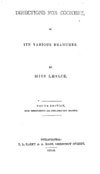DDV CULINARY WEBSITE
CULINARY ARTICLES AND RECIPES
1840 - Directions for Cookery
Weights and Measures
DDV CULINARY

Weights and Measures
WE recommend to all families that they should keep in the house a pair of scales,
(one of the scales deep enough to hold flour, sugar, &c., conveniently,) and a set of tin measures: as accuracy in proportioning the ingredients is indispensable to success in cookery. It is best to have the scales permanently fixed to a small beam projecting (for instance) from one of the shelves of the store-room. This will preclude the frequent inconvenience of their getting twisted, unlinked, and otherwise out of order; a common consequence of putting them in and out of their box, and carrying them from place to place. The weights (of which there should be a set from two pounds to a quarter of an ounce) ought carefully to be kept in the box, that none of them may be lost or mislaid. A set of tin measures (with small spouts or lips) from a gallon down to half a jill, will be found very convenient in every kitchen; though common pitchers, bowls, glasses, &c. may be substituted. It is also well to have a set of wooden measures from a bushel to a quarter of a peck. Let it be remembered, that of liquid measure-- Two jills are half a pint. Two pints -- one quart. Four quarts -- one gallon. Of dry measure-- Half a gallon is a quarter of a peck. One gallon -- half a peck. Two gallons -- one peck. Four gallons -- half a bushel. Eight gallons -- one bushel. About twenty-five drops of any thin liquid will fill a common sized tea-spoon. Four table-spoonfuls or half a jill, will fill a common wine glass. Four wine glasses will fill a half-pint or common tumbler, or a large coffee-cup. A quart black bottle holds in reality about a pint and a half. Of flour, butter, sugar, and most articles used in cakes and pastry, a quart is generally about equal in quantity to a pound avoirdupois, (sixteen ounces.) Avoirdupois is the weight designated throughout this book. Ten eggs generally weigh one pound before they are broken. A table-spoonful of salt is generally about one ounce. |